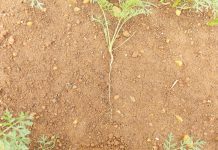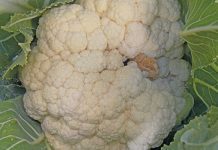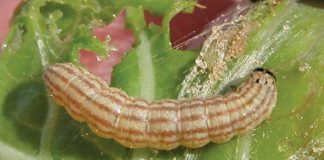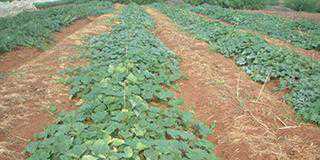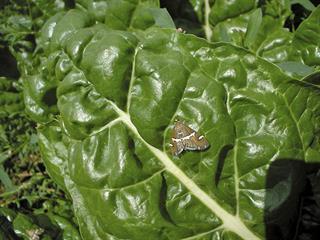
The system has not been exploited by growers as well as it might have been as it demands more knowledge, experience and crop inspection than simply spraying according to a set programme. And, of course, a set programme suits chemical companies better because more insecticide is used.
However, interest in IPM is growing as consumers become more mindful of the possible effects of chemical pesticides. This has led to retailers monitoring fresh produce for residues. I find farmers today are far more aware of the potential consequences of what they spray on their crops.
Recently, while a farmer and I walked through his land of Swiss chard, we flushed out some Hawaiian beet webworm moths. As we could see no larvae, the moths had most likely hatched from a small population that had not yet done any noticeable damage.
However, the number of moths we saw was high enough to result in damage to the chard when they laid eggs.
When the larvae hatched, the farmer could have sprayed a harsh chemical to ensure a healthy crop. Some moths would still have emerged from their pupae, however, requiring repeat applications at added cost. Fortunately, I was able to suggest an alternative solution involving IPM.
The Hawaiian beet webworm is preyed upon by a parasitic wasp. I suggested to the farmer that he use an insecticide that would not harm the wasps; this would allow the beneficial wasp population to build up and thus control the pest in that and nearby lands.
Organic industry
More and more pesticides target certain pests and allow the beneficial insects to proliferate and take over the pest control role. Many of these insecticides are naturally occurring fungi and bacteria cultured for the task. In some cases, they control a wide range of pests; this can be a problem, as they can end up killing benefical insects as well as pests.
As such, they are little better than broad spectrum chemical insecticides – their only benefit is that they are non-toxic to humans. Many registered products used by the organic industry fall into this category.
Another group of insecticides and nematicides is produced by culturing a specific soil-borne organism and using extracts from this to control the pest. More and more of these will appear in the future. They have a good shelf life and are less subject to specific climatic conditions for their efficacy than are living organisms.
Studying microbes
There are vast numbers of soil microbe species; our understanding of them is still limited, with many having not even being named yet. This is an area of substantial potential, not only for the development of natural pesticides and antibiotics but to culture organisms which make specific minerals available to plants from clay particles.
Plants are already doing this and we can learn from them.
Bill Kerr is a vegetable specialist and a breeder of a range of vegetables.


